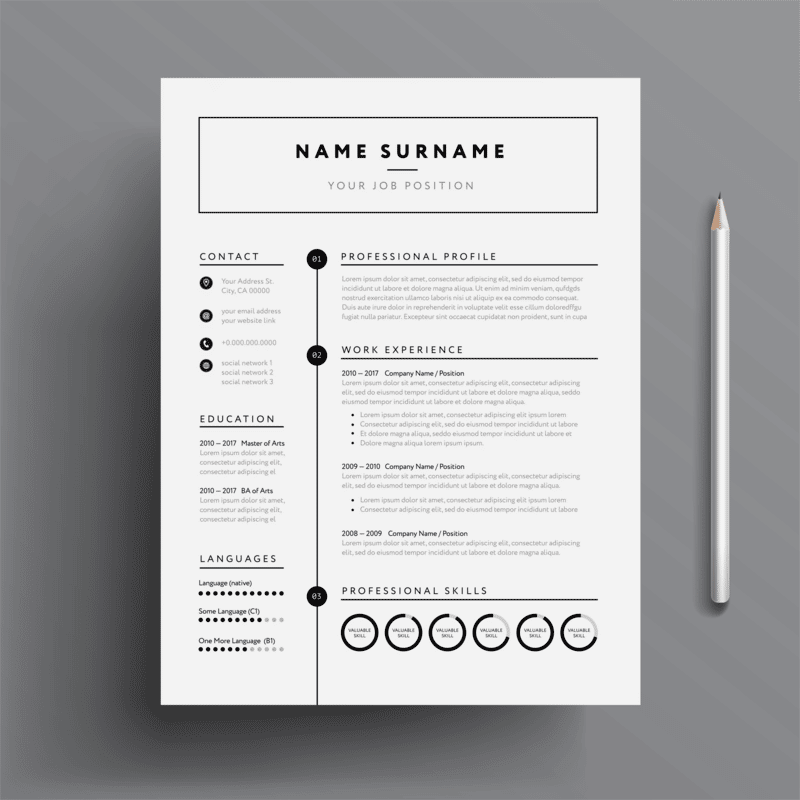In today’s legal market, law firms and hiring managers are inundated with resumes from highly qualified candidates. As a freelance attorney, it pays to know how to make your resume stand out from the crowd. An appealing resume can quite literally make or break your chances of securing work at a time when many are worried about the changing dynamics of the workplace.
In general, eye-catching resumes that secure lucrative work includes the following:
- Relevant credentials, including education, work history, court admissions, and professional and bar memberships,
- An aesthetically pleasing design,
- Relevant soft skills written with action verbs,
- Technological skills and capabilities,
- Specific and relevant information, and
- Experience that shows your entrepreneurial side.
At LAWCLERK, we understand the legal field is changing. Many attorneys are working from home and freelance employment relationships are on the rise. In many ways, the traditional methods of conducting a job search – like perusing a newspaper’s “help wanted” ads, are obsolete. It takes skill, expertise, and creativity to land a legal job in today’s world.
Firms that hire freelance attorneys are likely busy and overwhelmed with their caseload (hence the need to hire an attorney). That means hiring attorneys have limited time to devote to reviewing resumes and selecting a suitable candidate. Freelance attorneys need to craft eye-catching resumes with credentials that jump off the page – catching the eye of the hiring attorney (or recruiter) right away.
In this article, we will provide actionable tips for attorneys looking to create a stellar freelance resume that captures the attention of busy law firm owners. Let’s start with a review of the basic credentials that must be included on any resume, then we will take a look at some lesser-known extras that will help your resume stand out to a potential employer.
Information To Include on Every Legal Resume
All professional resumes should include basic information like your education, work history, and professional memberships. To get an idea how to present this information, it may help to peruse resume templates and attorney resume examples. Pay close attention to the types of resumes that capture your attention at first glance – because you will want your resume to be as attention-grabbing as possible. Remember, recruiters and hiring attorneys are busy professionals who likely encounter dozens, if not hundreds, of legal resumes. A boring, run-of-the-mill resume template that looks the same as every other candidate’s is not likely to leave a lasting impression.
Nevertheless, hiring attorneys need to see (immediately) that you meet the basic qualifications of the role based on your education, experience, and court admissions. Make this information easy to find, otherwise your resume might not make it beyond the recruiter’s inbox.
Education Details
You must include information about where you attended law school and when you graduated (or when you expect to graduate if you are still a student). Do not include your high school as this information is not important and takes up valuable space.
If you had an outstanding GPA or received any awards, that may be worth including as well. However, you should only include your GPA if you were toward the top of your class – informing a potential employer that you had a 2.0 GPA in law school is a surefire way to get your resume tossed aside.
Work History
It is always important to include professional experience, but you should narrowly tailor your work history to that which is most relevant to the job you are seeking. Since most attorneys are in their late 20s by the time they finish law school, many have had extensive work experience. But that summer you worked as a lifeguard when you were 17 probably will not apply to your work at a law firm, so it is not worth including.
On the other hand, legal research conducted as a paralegal or a writer for your school’s law review journal is relevant and could set you apart from other candidates. In a nutshell, it pays to be selective with the work history you include. Make sure it is short, to-the-point, and relevant to the job title for which you are applying.
Court Admissions
When applying for a legal job, it’s imperative that you share where you are admitted to practice law. Even firms looking for freelance attorneys want to know job candidates are licensed and aware of the rules of professional responsibility.
Professional and Bar Memberships
Much like court admissions, legal resumes should always include information about membership in any bar associations or professional organizations. Especially if you are applying for a role within a legal niche, it helps to show membership in niche-specific legal organizations, because it can demonstrate how committed you are to a particular practice area. If you are applying to a real estate law firm, for example, it may help to list your membership in the American College of Real Estate Lawyers – just make sure any professional associations you list are relevant to the job at hand.
Content That Will Make Your Resume Stand Out

Once you draft the basic portions of your resume, it’s time to bolster it with the type of customized content that will jump off the page to a recruiter.
-
Ensure Your Resume is Aesthetically Pleasing
Hiring managers have likely seen hundreds of resumes, and seeing the same generic format repeatedly gets old fast. Ideally, the appearance of your resume will catch the hiring attorney’s eye before they even look at your credentials. Do not be afraid to use pops of color to stand out, just keep it professional (you’re not looking for a graphic design position, so you don’t need a rainbow of colors or custom graphics). Nevertheless, a professional-looking resume that looks as if you may have enlisted the help of a designer does not hurt – it shows you go the extra mile (a quality most recruiters are looking for). A single, professional headshot can also humanize you and set a positive first impression.
Aside from the graphic elements of your resume, it is important to ensure everything is easy to read. Use a standard, reasonably sized font, bullet points, and try to fit everything on one page. A hiring attorney should be able to glance at your resume quickly and gather all the information they need to know.
-
Include Relevant Soft Skills With Action Verbs
It can help to list soft skills that are relevant to the position but be wary of going overboard with cliché lists of skills. Your customer service skills may not be relevant if you are applying for a position that solely entails research and writing. When candidates simply write a list of skills like “problem solving,” and “detail-oriented,” it tends to blend in with a sea of other candidates claiming the same. Problem-solving skills are almost a given in the legal profession, after all, you attended law school and passed the bar where problem-solving was par for the course.
Consider making a separate list of soft skills that you think are relevant to the position for which you are applying. Then, think of examples of when you used those skills. Instead of listing, “negotiation” for example, write “I negotiated a $5 million merger between 2 competing firms.”
The point is to keep everything relevant to the position, making it appear as if you are creating a unique resume for each application.
-
List Your Technology Skills and Capabilities
Hiring attorneys can save time and money onboarding a freelance attorney who already has access to and experience with legal technology, but many candidates fail to share this information on their resume. For freelance resumes, in particular, it’s crucial that you show your technological capabilities and tools at your disposal.
Let’s say you are applying to an estate planning firm – it helps to say you have access to WealthDocx or know how to use estate plan drafting software. If you are going to be meeting with clients virtually, you might want to show off your Zoom skills or knowledge of case management tools like Clio, Practice Panther, or MyCase. If you pay for your own legal research tools, list them as well.
-
Make Your Resume Highly Specific and Relevant to the Role For Which You Are Applying
You may notice a theme throughout this article: nearly everything you list on your resume should be relevant and narrowly tailored to the job description at hand. As an attorney you need to know how to appeal to target audiences, and your potential employer is the target audience for your resume. Show off your persuasive abilities by focusing only on your most relevant accomplishments.
If you are applying to an immigration law firm, your real estate closing experience is not relevant. Hiring attorneys view irrelevant resume content as either sloppy, careless, or unnecessary filler. It may indicate that you are using a single, generic resume for every job you apply to – or worse, that you don’t review and edit your work. They may even assume that you do not understand what the job entails, or you do not have enough relevant experience.
Most firms today focus on niche practice areas (gone are the days of general practices) and the legal experience needed in different practice areas varies greatly. Including only the most relevant information is a way to show that you know exactly what skills and expertise a position requires.
If you speak any additional languages and feel it could be useful to the firm to which you are applying, include it on your resume. Definitely list any representative cases (omitting confidential information) you have been involved with that show your ability to meet the demands of the role.
Finally, if you have stellar references from other attorneys you have worked with, you may want to include them. Many attorneys use the generic, “References available upon request” on their resumes, so preemptively listing contact information for a reference could help you stand out.
-
Identify Professional Experience That Shows Your Entrepreneurial Side
Law firms are a business like any other, and that means attorneys with entrepreneurial skills have an advantage over those who do not. It pays to show a potential employer that you know what it takes to attract potential clients and bolster a firm’s reputation. If you have authored any articles or had any speaking engagements, display them on your resume. Both show that you are a respected expert in your field and know what it takes to market yourself as an attorney.
Likewise, if you have professional social media accounts (particularly LinkedIn) list them under your contact information. Of course, this is only if you have professional accounts – it is not wise to list personal social media accounts that you use for communicating with friends and family.
-
Provide Information Relevant to Freelancing
Freelancing roles require slightly different skills than that of a traditional associate attorney. Consider explaining why you chose freelancing in your cover letter when you apply for a role. It can humanize you and answer questions a hiring attorney is bound to ask. Also clarify the hours you are available to work and your time-zone if you are applying with a firm in a different part of the country.
Additional Tips for Crafting a Winning Resume
If you want your resume to stand out from a pile of others, think about hiring a resume consultant. Professional consultants can give you an edge in a highly competitive job market. They can also review your resume with “fresh eyes” and may spot typos or errors you did not notice on your own.
Once you feel you have a winning resume, you should also brush up on your cover letter skills. Submitting cover letters is an additional way of standing out and provides you with a chance to elaborate on information that you didn’t have room to include on your resume.
LawClerk Connects Freelance Attorneys With Hiring Firms
Our platform enables attorneys to find virtual freelance attorneys for one-off and long-term projects alike. We make it easy for qualified attorneys to find remote, freelance work without the fear of nonpayment. Attorneys also have unlimited control over the type of work they perform, who they work with, and their schedules. We provide free articles and tips like this to help virtual lawyers brush up on job skills and find work that best suits their lifestyle.



















